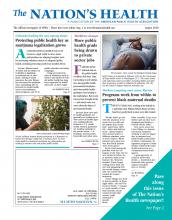Experiencing racism can hurt people at the cellular level, a new study shows.
According to research published in August in Psychoneuroendocrinology, the stress of experiencing racism may lead to an increase in inflammation and a decrease in antiviral response. Inflammation is linked with many health conditions, including cardiovascular disease, Type 2 diabetes and cancer. Lower antiviral responses might make people more susceptible to contracting viruses, including HIV.
The findings show that racism can be physically detrimental to health, said April Thames, PhD, lead researcher of the study and an associate professor of psychology at the University of Southern California.
The study explored how racism and perceived discrimination affected people on the cellular level by analyzing survey responses and examining blood samples, two-thirds of which were from black participants. The researchers measured leukocytes in the blood, finding pro-inflammatory and antiviral patterns to be more prevalent in black participants.
“The idea that these genes are being expressed in an abnormal way may explain why these chronically stressed groups are more likely to get sick and more likely to get diseases,” Thames told The Nation’s Health.
Researchers controlled for other life circumstances that might confuse the results by finding participants with similar socio-economic profiles and self-reported stress. It was only when they took racist experiences into account that data lined up. The study found that racial discrimination accounted for over half of the differences in inflammation in blacks and roughly 15% of the differences in antiviral patterns.
Experiencing racism and discrimination should be viewed as a health risk factor similar to smoking, obesity and high blood pressure. It is a “chronic stressor,” Thames said. While events such as losing a job or house can be difficult, that stress can usually be managed by taking steps to solve the problem. Being on the receiving end of racism or discrimination is different.
Without having clear evidence, people of color may suspect that they were discriminated against in life events such as not getting a promotion or being rejected when buying a house or renting an apartment.
“You can’t change your skin color, and you don’t always know when it’s happening.” Thames said. “It’s always a feeling of this constant potential judgment that creates this long-standing threat that people experience, and we’re seeing implications on actual biological outcomes.”
The researchers noted that further study is needed. The study design allowed the researchers to find support or partial support for their hypothesis, but prevented researchers from drawing causal conclusions. A larger study would help determine if the higher prevalence of pro-inflammatory gene patterns results in poor health over time. Further, the researchers want to examine if people who experience discrimination on the basis of race and HIV status would have an even higher prevalence of the patterns.
Read the full study online.
- Copyright The Nation’s Health, American Public Health Association









